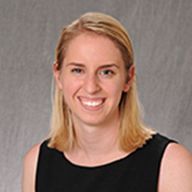One of our goals for this newsletter is to connect GWIMRes alumni with current residents. Each newsletter will shine a spotlight on the story of one current resident. In this issue, we introduce you to Dr. Meredith Trubitt.

Meredith Trubitt, MD, MPH is a current PGY3 resident. After leaving her hometown of Dallas, Texas, Dr. Trubitt attended college at University of Richmond. She then attended Texas Tech University Health Sciences Center El Paso, taking an extra year to complete a Master of Public Health degree through University of Texas. Dr. Trubitt is part of the Underserved Medicine and Public Health (UMPH) concentration, through which she sees patients longitudinally over two years at Whitman-Walker Health in addition to her Medical Faculty Associates continuity clinic. Her preceptor at Whitman-Walker Health is Dr. Raymond Martins (Res'03). The program, co-directed by Dr. David Popiel (Res'10) and Dr. Jillian Catalanotti, also consists of monthly evening seminars and self-study assignments as well as a practicum project.
We sat down for an interview with Dr. Trubitt.
Q: What has been your favorite part of residency training at GW?
MT: My favorite part of residency training at GW has been the Underserved Medicine and Public Health (UMPH) track. Throughout undergrad and medical school it was my public health and humanities interest that always grounded me when the science got too rigid. UMPH has been that North Star during residency. Every month we explore different topics related to underserved populations or public health, and we share in a joint interest of helping further these areas in the setting of clinical practice. It has been a truly inspiring experience from start to finish, and has broadened my career interests even further.
Q: What are you looking forward to about your future career in medicine?
MT: Honestly, I look forward to patient care, and continuing to grow as a clinician. I have many different interests that I hope to combine in my clinical career including addiction medicine, advocacy, teaching, LGBTQ healthcare. I can see myself mixing all of these with clinical practice at different stages of my career.
Q: How did you get your idea for your UMPH practicum project and what do you hope to accomplish with it?
MT: I have spent the last year developing an intervention to help teach residents and faculty the ins and outs of prescribing nasal naloxone (Narcan) along with other harm reduction modalities in the setting of the opioid epidemic.
The idea started quite small, and honestly has blossomed into something much bigger. One of the VA attendings, Dr. Jesse Theisen-Toupal, had reached out to Dr. Catalanotti asking if there were any residents or students interested in safe injection practices. He wanted to help create an info guide for patients prior to discharge. Around the same time, Dr. Catalanotti had brought to my attention that Walgreens next to the hospital, with which we have a bedside delivery system, had just started stocking nasal Narcan on their shelves. It sort of just clicked thereafter that we could create a nice tidy way to discharge patients from the hospital with an information packet explaining safe injection practices and how to use Narcan, and then they could get Narcan delivered to bedside so that they would have all the information and supplies to use with a little less risk. It spiraled after that to include me designing a 2.5 hour workshop on opioid harm reduction techniques for the residents in both inpatient and outpatient settings. I have now taught residents, faculty, and our wonderful clinic medical assistants, and am looking to teach the inpatient nurses and the Emergency Medicine residents. I just submitted a version of the workshop for presentation at a national conference (fingers crossed!).
My only goal with the project was to feel like we as residents were making an impact. It is so hard to listen to the news and not be doing anything. This takes all of us less than 2 minutes to do, and already fits into our work-flow. I just wanted to feel like I was doing something to help; and, I wanted to give my co-residents the same opportunity. It's that purpose which fends off my burn-out and I hope it does the same for my co-residents.